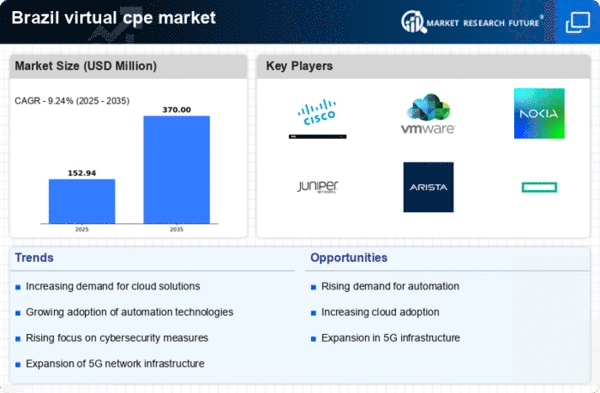Rising Demand for Network Flexibility
The virtual cpe market in Brazil experiences a notable surge in demand for network flexibility. As businesses increasingly seek to adapt to changing market conditions, the ability to scale network resources dynamically becomes essential. This trend is particularly pronounced among small and medium-sized enterprises (SMEs) that require cost-effective solutions to enhance operational efficiency. According to recent data, the adoption of virtual CPE solutions has grown by approximately 30% in the last year alone, indicating a strong preference for flexible networking options. The virtual cpe market is thus positioned to benefit from this shift, as organizations prioritize agility and responsiveness in their network infrastructure.
Cost Efficiency and Operational Savings
Cost efficiency remains a critical driver for the virtual cpe market in Brazil. Organizations are increasingly recognizing the financial advantages of deploying virtual CPE solutions over traditional hardware-based systems. By leveraging virtualization, companies can significantly reduce capital expenditures and operational costs associated with network management. Reports suggest that businesses can save up to 40% on their networking expenses by transitioning to virtual CPE solutions. This financial incentive is compelling for many Brazilian enterprises, particularly in a competitive economic landscape. Consequently, the virtual cpe market is likely to see continued growth as organizations prioritize cost-effective networking solutions.
Growing Focus on Digital Transformation
The ongoing digital transformation initiatives across various sectors in Brazil significantly impact the virtual cpe market. Organizations are increasingly investing in digital technologies to enhance customer experiences and streamline operations. This shift necessitates robust and flexible networking solutions, which virtual CPE can provide. As businesses embark on their digital journeys, the demand for virtual CPE solutions is expected to rise. The virtual cpe market is likely to benefit from this trend, as companies seek to align their networking capabilities with their broader digital strategies, fostering a conducive environment for growth.
Technological Advancements in Virtualization
Technological advancements play a pivotal role in shaping the virtual cpe market in Brazil. Innovations in virtualization technologies, such as software-defined networking (SDN) and network function virtualization (NFV), are enhancing the capabilities of virtual CPE solutions. These advancements enable more efficient resource allocation, improved network performance, and greater scalability. As Brazilian companies increasingly adopt these technologies, the virtual cpe market is poised for expansion. The integration of advanced features, such as automated provisioning and real-time monitoring, further enhances the appeal of virtual CPE solutions, making them a preferred choice for modern enterprises.
Increased Regulatory Support for Telecommunications
Regulatory support for telecommunications in Brazil is emerging as a key driver for the virtual cpe market. The Brazilian government has implemented policies aimed at promoting digital infrastructure development and enhancing connectivity across the nation. These initiatives create a favorable environment for the adoption of virtual CPE solutions, as they align with national objectives to improve telecommunications services. The virtual cpe market stands to gain from this regulatory backing, as it encourages investment in innovative networking technologies. As compliance with regulatory standards becomes increasingly important, organizations are likely to turn to virtual CPE solutions to meet these requirements.
















